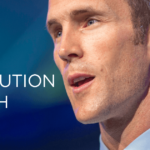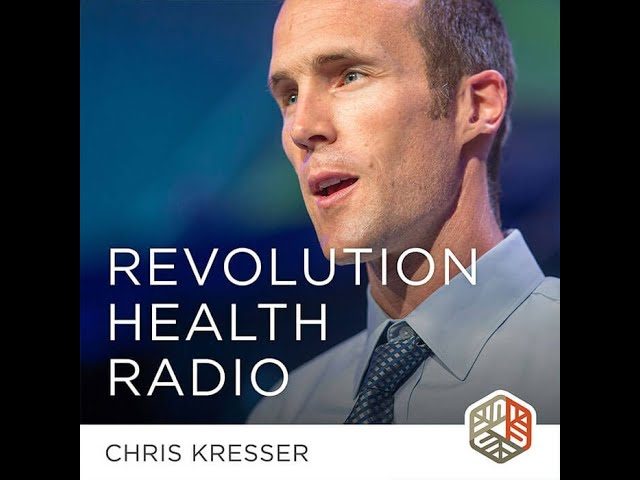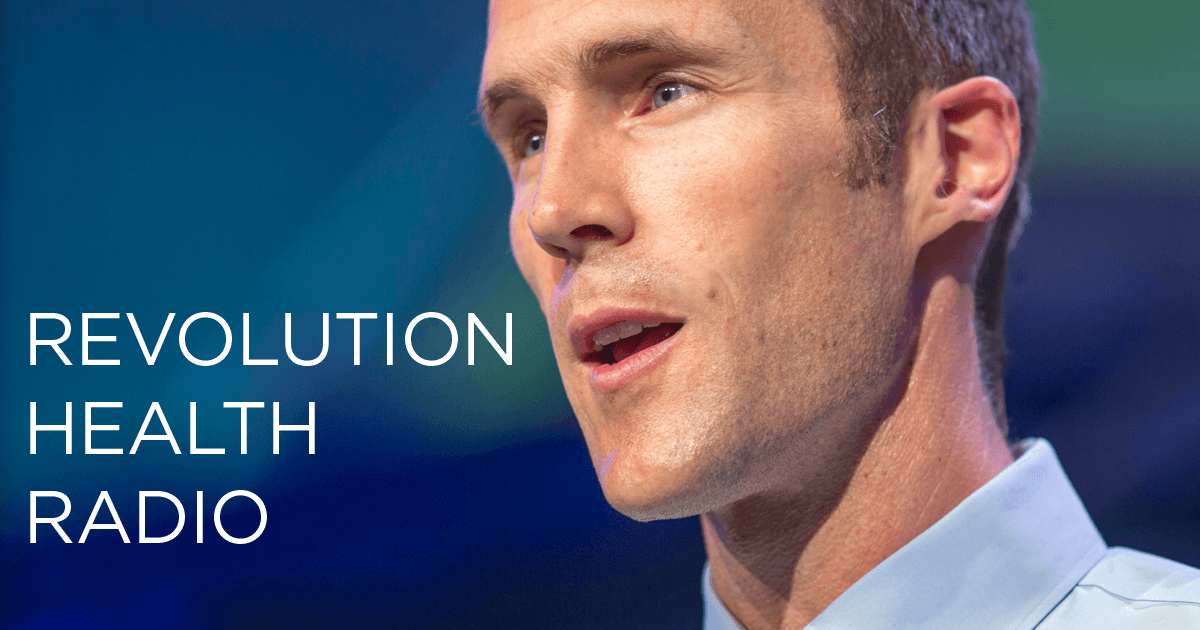
RHR: Reflections on The Game Changers Debate

Page Contents:
In this episode, we discuss:
- Debunking some of the claims made during the debate
- My educational and professional background
- More resources on the animal vs. plant foods debate
- The problem with searching for a consensus in nutrition
Show notes:
[embedded content]
Chris Kresser: Hey, everybody. This is Chris Kresser. Welcome to another episode of Revolution Health Radio. This week, I’m going to do something a little bit different, which is to reflect on the debate that I recently had with James Wilks on The Joe Rogan Experience about the film The Game Changers. As you may know, I did an earlier episode on the Joe Rogan podcast debunking many of the claims that were made in the film The Game Changers and addressing the scientific evidence that they referred to in the film in support of the claims. And then, Joe asked me to come back on [the show] about a week later to have a debate with James Wilks, who was a producer on the film and the narrator and protagonist of the film.
So that was in early December, and I just wanted to circle back and make some general comments about the debate and what happened, and then address some of the specific claims that were made in the debate so that folks who saw the debate and were confused by it can maybe have a little bit more clarity.
Debunking Some of the Claims Made During the Debate
So, going into the debate, I’d hoped that it would be more about the science underpinning the film. That was my focus in the debunking episode that I did with Joe a week before the debate, because I think there were many misleading and disingenuous, if not outright false, claims in the film. And my intention was to bring those to light because I knew a lot of people had already seen the film and were going to see the film. But instead, the debate ended up being a lot more about appeals to authority and semantics, and even personal attacks against me and my credibility. And, as he did in the film, James also cherry-picked and misrepresented studies in the debate in support of his point or the point he was trying to make. And despite emphasizing the importance of looking at the totality of evidence himself during the debate, he ignored his own advice on several occasions and chose single studies to support his view rather than looking at the totality of the evidence.
I wasn’t able to respond during the debate to some of the studies he presented because I hadn’t read the full text. And this is, of course, a disadvantage of a live debate format when discussing scientific issues. It’s really not the best medium for those discussions. Because if someone says, “Hey, look at this study,” you don’t have the opportunity to read the full text and analyze it as you would if it was happening in written format, for example. And that’s true of both sides. And that’s really why you don’t see a lot of live debates on scientific issues.
But after the debate, I was able to read the studies that James referenced, and in most cases, they actually didn’t support his point at all. So this means that he was either willfully misrepresenting the studies, or he didn’t read the full text of the studies, or he did read the full text and didn’t understand it. All those possibilities are disturbing.
So one example of this is, in the film, James claims that humans used to get all the [vitamin] B12 that we needed from eating unwashed vegetables or drinking water from streams. And the idea is that bacteria primarily produced B12. And these bacteria were in the soil and water, and produced B12 that we could get from consuming the soil and the water. But that today, because of chemical agriculture and depletion of B12 in the soils, that’s not possible. The problem is, as I pointed out in my original debunking episode, there’s no evidence to support this claim that humans used to get adequate levels of B12 from eating dirt or drinking water. And that that’s happening still today. So, in support of his argument, he produced a paper that, on the surface, appeared to support this claim. It was a study of a group of people, vegetarians and vegans in Iran, who were not consuming animal foods and yet their B12 levels were adequate. And they were consuming produce that was not washed.
Well, what James didn’t mention, and what you can quickly learn if you look into the full text of the study, is that these people were using what is colloquially referred to as “night soil” to fertilize their vegetables. So, night soil is human excrement. And this is a practice that was done in China thousands of years ago, and it’s still done in some parts of the world. And the reason that this is significant is that human beings have bacteria in our gut that produce B12. So do ruminants and other animals. In the case of ruminants, they’re foregut fermenters.
So, when the B12 produces bacteria in their gut, these ruminant animals can actually absorb that B12 and utilize it, whereas humans and other primates are hindgut fermenters. So, we cannot absorb and utilize the B12 that the bacteria in our guts produce. Instead, we poop it out. So the only way that we can access that B12 is if we’re coprophagic, which means eating our own poop. And that’s what gorillas and chimps do. That’s one way that they get B12. Or if, as in the case of these people in Iran, they are fertilizing the soil with their own excrement and the B12 from their excrement gets into soil, and then they were eating unwashed vegetables that contain the B12 from their excrement.
So that’s a really important distinction, obviously. To say that humans used to get B12 from soil and water, and could still do that in theory if it wasn’t for chemical agriculture, is just a complete misrepresentation and ignores the very important part of the story that I just mentioned. So this is just one example. I’m not going to go into others specifically here today. We talked a little about those in the debate, and I also mentioned them in my original debunking episode, which I’ll link to a little bit later.
My Educational and Professional Background
But this single example is really illustrative of what I’m talking about here. So, before we go any further, I want to briefly address one of the claims that Wilks made about me personally in the debate. And it was pretty clear from the outset that his strategy was to undermine me personally, and attack my credibility. He asked me very early on if I considered myself an expert on nutrition. And I thought about that, and I answered “no,” because I don’t have a master’s degree or a PhD in nutritional science. And that’s, in our society, what I think would confer the title of “expert in nutrition.”
He also asked me if I could read a forest plot, and he was holding a study when he did that. And I couldn’t see the plot he was referring to, and I didn’t remember off the top of my head which type of plot a forest plot referred to. So I said, no. I suspected a trap or a gotcha. And I think I was correct in suspecting that. Incidentally, once I saw the plot, I did, in fact, recognize it, and just didn’t know it by name. But he used my responses to these two questions to claim that I’m not qualified to interpret the scientific literature. And then he equated himself to me in terms of background and experience, saying something to the effect that neither of us are scientists. He said, “I’m not qualified to do it. I’m just a combatives instructor, and you’re not qualified. But I had a team of the top scientists working on the film.”
Now, if you’ve been following me or my work for any length of time, you probably know I’ve never been one to focus [too] much on my credentials. I like to let my work speak for itself. And some of the smartest and most astute people I know, working in the field of nutrition, don’t have traditional credentials. So Denise Minger is a great example. She was an English major, I believe, and has no formal training in nutrition or biomedical science. And yet, I find her to be one of the sharpest thinkers in the nutrition world. But it’s not true in my case, actually, that I don’t have formal training in nutrition and biomedical science. James pointed out in the show correctly that I’m an acupuncturist, not a physician, or a PhD in nutrition. And that is true, but what he and many others may not be aware of, and perhaps some of you aren’t aware of, because I, as I said, don’t tend to dwell on this, I have a master’s degree in science that I earned in California. And in California, acupuncturists are considered primary care providers in the workers comp system, which means that we have to be able to diagnose conditions, and we’re authorized to order labs and make diagnoses based on that as part of our scope of practice.
This is really different than in other states. In some states, acupuncturists are not licensed, and I don’t think [in] many other states, maybe there are two other states in the [United States], that they receive this kind of training. So it’s possible that James wasn’t aware of this. But we actually get extensive training in biomedical sciences, and this is what qualifies us to earn a master’s degree in science, which, of course, the state of California doesn’t just hand out unless certain requirements have been met. So, for example, my graduate master’s level training includes:
- Biology
- Anatomy
- Physiology
- Pathophysiology
- Biochemistry
- Medical terminology
- Pharmacology
- Integrative medicine
- Nutrition
- Research methodology
So this means that I do, in fact, have the scientific background necessary to read and interpret the literature.
James Wilks was a combatives instructor or is a combatives instructor without any graduate-level training in science. So to suggest that we have the same level of formal training and science was incorrect. And, again, he may not have been aware that acupuncturists in California receive this kind of training. Very few people are. Or that we have the broader scope of practice, much broader scope of practice in California than in any other state. And in retrospect, even though this is something that I don’t tend to dwell on, I regret that I didn’t make this more clear in the debate. But it’s not my style to lean on my own credentials. And I prefer to let the science speak for itself.
And I did apply the scientific method to each and every argument that I made during the debate and during the debunking episode the week before. But because of the contentiousness and almost kind of circus-like atmosphere in the debate, which is not what I was prepared for or what I was expecting, I fear that I failed to convey some of those points as well as I could have during various parts of the debate. And that listeners may not have been able to follow the lines of reasoning in such a combative setting.
If you need more clarity on the topic of animal foods vs. plant foods, you’re not alone. Check out this episode of RHR for more information on my latest appearance on The Joe Rogan Experience. #chriskresser #nutrition #paleo
More Resources on the Animal vs. Plant Foods Debate
So I wanted to take the opportunity to direct you to this information now so that you can get the full story. First, if you haven’t already, listen to my original debunking episode of The Game Changers on Joe Rogan’s podcast. And I created a short link to make it easier for you to find it. You can go to Kresser.co/gcdebunk. That’s “Kresser.co/gc” (for Game Changers) “debunk,” all one word. I go into great detail on the issues with the film, and the critiques that I made in that episode still stand. Most of them were not even addressed by Wilks in our debate, and even those that were, are still sound.
Second, check out the extensive written material I put together leading up to the debate. All the references and studies and more thorough explanations are there. And, again, written format is really the best one for delivering this kind of information. I think you’ll see that the science speaks for itself, and it’s not about who talks the loudest and most aggressively. So all those resources can be found at Kresser.co/gamechangers. Third, since the Wilks debate, there have been several critical analyses published both in written format and video that debunked Wilks’ claims during the debate, including the B12 paper where he conveniently didn’t mention that those people were fertilizing the soil with their own excrement. But there were many other examples.
You could call these debunkings of the debunking of my debunking. So it’s getting pretty convoluted, but there are a few really good analyses out there. And rather than recreate the wheel, I figured I would just link you to those because they’ve been well done and they make all the points that I would have made in my own follow-up. So we’ve linked to these analyses on the Game Changers page on our site that we created. So again, that is Kresser.co/gamechangers.
The Problem with Searching for a Consensus in Nutrition
One of the biggest overall problems with Wilks’ critique or his claims in the debate was the nearly constant appeal to authority and consensus science on nutrition. So there are some issues that science has reached consensus on. I’d say climate change and the world being round rather than flat are two that come to mind. But to suggest that such consensus has been reached on the idea that animal products are harmful and a vegan diet is the best choice is complete fantasy. There is not nearly the same level of consensus there that we have on other issues. And, in fact, there are many credible, reputable scientists that would tell you that animal products are healthy and beneficial when consumed in the context of a nutrient-dense, whole foods diet, and that there’s not sufficient evidence to suggest that a vegan diet is the optimal choice.
So to suggest that there’s universal agreement on this among the top scientists in the world is, again, disingenuous and misleading. What’s more, a consensus can and does change over time. Hundreds of years ago, the consensus was that bleeding people heavily could cure their illnesses. And this is, incidentally, probably what killed George Washington. And there was also consensus around that time and later that giving people mercury was a good treatment for many different diseases. More recently, consensus was that stress was the sole cause of ulcers. We now know that a bacterium called H. pylori, Helicobacter pylori, plays a significant role. There was consensus that eating dietary cholesterol raises cholesterol in the blood and increases the risk of heart disease. We now have many large reviews and tightly controlled egg feeding trials that have disproven this. And, in fact, the United States quietly removed the restriction on dietary cholesterol from the Dietary Guidelines in recognition of this back in 2015.
For many years, most of my childhood, fat was seen as the enemy. We now have much better research that suggests that that is not the case. And again, the [United States] removed any restriction on total fat from the Dietary Guidelines in 2015, although they still do limit and suggest restricting saturated fat. Even that has now come under attack by several large meta-analyses that have found no association between saturated fat intake and any negative health outcomes, and also, these meta-analyses, including more recent randomized controlled trials, are much more reliable than observational studies in epidemiology.
So these are just a few examples of how consensus can change over time. And, for this reason, some of the best scientists in the world, [like] John Ioannidis, who’s a Stanford professor, and one of the foremost epidemiologists in the world, have criticized consensus-based science and relying on the claims of authorities in the nutrition field and reading too much into nutritional epidemiology. [Dr. Ioannidis is] the author of one of the most cited papers in the scientific literature called “Why Most Published Research Findings Are False.” The most famous quote from that paper is:
“Claimed research findings may often be simply accurate measures of the prevailing bias.”
In other words, what happens is you get claims made initially in the literature, and then new papers that are published reference those claims even if the claims are not true. Then, new papers reference those papers, which were referencing the original claims, and you just get this snowball effect that happens, and the whole thing could end up being a house of cards if those original claims were not accurate. And that’s exactly what Dr. Ioannidis is saying. He also has said that meta-analyses in this environment can simply become “weighted averages of expert opinions” rather than good science. “In an inverse sequence,” he said, “instead of carefully conducted primary studies informing guidelines, expert-driven guidelines shaped by advocates dictate what primary studies should report.” So, in other words, we have agenda driving science instead of science driving agenda.
So we really should not rely on consensus, especially in the case where consensus doesn’t exist for some of these nutrition issues. Another well-known epidemiologist, Syd Shapiro, had a similar take on this when he said, “We should never forget that good science is skeptical science.” One way in which science proceeds is by attempting to falsify hypotheses. And further, we can embrace any given hypothesis, and then only tentatively only for as long as we’re unable to falsify it. So I know that many people are confused and disturbed by films like The Game Changers. They can be persuasive, at least on the surface, and cause people to doubt their diet choices, and that’s exactly the intention of a film like this. They tend to be agenda-driven rather than evidence-based. And they share a consistent pattern of distorting the science, cherry-picking, and, in some cases, outright lying to further the agenda.
So, in the case of The Game Changers, one of the chief scientific advisors was Dr. Michael Greger. He’s notorious for cherry-picking and making unsubstantiated claims. Another was a nutritionist named David Goldman. David Goldman’s mentor is Neal Barnard, who’s a non-practicing psychiatrist, not a nutrition expert. Physicians take one nutrition class in medical school, and, technically, then I have more formal training in nutrition at the graduate level than Dr. Barnard has, for whatever that’s worth. He’s been called out on multiple occasions for not disclosing his animal rights agenda and how that influences his dietary recommendations. And he’s also notorious for making spurious and unsupported claims to support a vegan diet. Dr. Barnard is the medical advisor for PETA [People for the Ethical Treatment of Animals], and until recently was president of the PETA Foundation, which owns PETA’s real estate and pays most of its salaries. He’s also the founder of the so-called Physicians Committee for Responsible Medicine [PCRM], which is an animal rights group rather than a medical organization. So the name of that group is a little misleading.
And Dr. Barnard and PCRM have a fairly extreme animal rights agenda, which I think hugely distorts their view of the science. He’s been known to make absurd statements like “to give a child animal products is a form of child abuse.” That’s a direct quote. Another direct quote, “Meat consumption is just as dangerous to public health as tobacco use,” which is patently and demonstrably false. He’s also claimed that dairy products contain morphine. And he’s just made a whole bunch of statements that are just completely inaccurate and untrue scientifically, to further his vegan agenda.
So none of this automatically discredits The Game Changers, but it does call into question the agenda and motivations of the people who are involved in the film. And I think it does raise questions about how much we can rely on their interpretation of the science. For many years, I strove to make my website a comprehensive resource with reputable scientific references for those that want to understand more about the place of meat and animal products in a whole foods diet. I think the best place to start is a page I put together for the debate I did last year on Joe Rogan’s show with vegan physician Dr. Joel Kahn. That debate was much more focused on the science then the recent Game Changers debate, and [it] is a good resource if you want to know what the research really says about the role of animal products in a healthy whole foods diet.
And, as I did with The Game Changers debate, I put together a really exhaustive, comprehensive resource for that debate, which I think is, at least as far as I’ve seen, the most complete online resource on this topic of the role of animal products in a healthy diet online. And that’s [available at] Kresser.co/rogan.
So I want to end this episode by thanking you all for your support. I wish the debate with James Wilks would have been less of a circus and more of a discussion of the science. But looking back, it was pretty clear that he wanted to avoid talking about the science in the film in detail because it doesn’t really stand up to scrutiny, as I pointed out in the three-and-a-half-hour debunking episode that I did with Joe Rogan prior to the debate. So, once again, here are the links for more information. You can also find them in the show notes of this episode on my website ChrisKresser.com. So kresser.co/gcdebunk, that’s my original episode where I debunk the claims made in the film The Game Changers on The Joe Rogan Experience. It’s long. It’s over three hours, but very much worth watching or listening to if you’re interested in this topic.
Kresser.co/gamechangers has all the references and written material for that debunking episode that I prepared leading up to the Joe Rogan show. And it also links to some of the more recent critiques that have been done after the debate I did with James Wilks. So these are critiques and analyses that were created by third parties that analyze the claims that Wilks made in the debate with me. And then the last is Kresser.co/Rogan, which is the comprehensive resource examining the role of animal foods in a healthy diet that I put together before my debate last year with vegan physician Dr. Joel Kahn. Okay, that’s it for now. Thanks, everybody, for listening, and I’ll talk to you next time.






